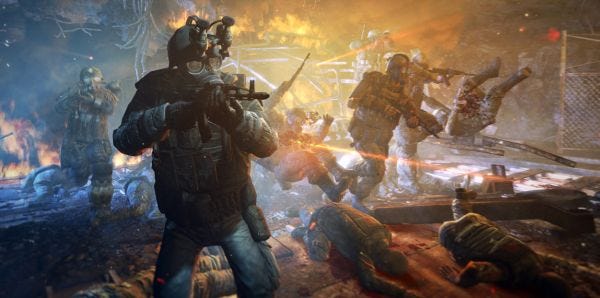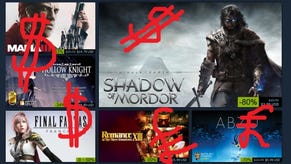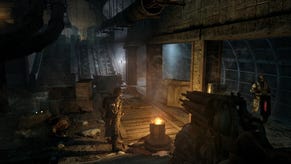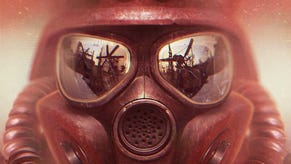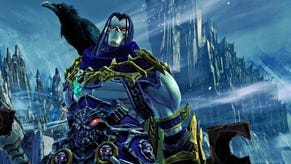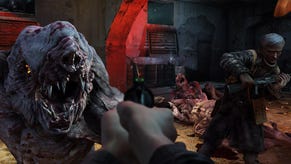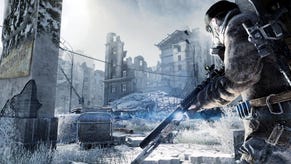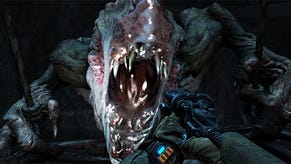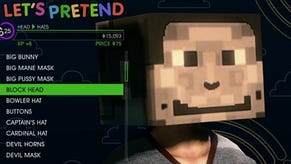4A On Making Metro Smarter - Not Dumbing It Down
Metro Interview, Pt 1
Metro 2033 had its fair share of rough edges. Shooting was clunky, some systems felt overly complex, and others were so under-explained that many players didn't even know they existed. Even so, a lot of love obviously went into the construction of its bombed-to-the-brink-of-extinction post-apocalyptic Russia. In smoothing out rough edges, however, many other game series have opted to lop off entire aspects of what made them so great - generally in the nebulous name of "accessibility."
4A Games, though, doesn't believe that's necessary. In fact, according to communications lead Huw Beynon, Last Light's adding - not subtracting. So then, how exactly will that work? And, if this is something that's in such high demand, why aren't more developers trying it? Read on for answers to those questions and many more.
RPS: So, first off, what's the deal with the bullet economy this time around? Is it in or out? I've heard mixed things.
Beynon: It's in. I think we were still discussing exactly how we were going implement that last time and, you know, all options are still on the table. But there's quite a vocal fan response, which may be guiding part of our thinking. It's staying in, though.
The thing we're already working on is how we communicate that system better to the player. Metro's full of a lot of quite complex game mechanics, and I think if there's one thing we didn't do very well in the first game, it's we didn't actually introduce those mechanics or explain them particularly. It was kind of, concept, wall of text on the screen, this is how this works. Have you read it? Press H, continue. If you missed it, it could really color your impression of the whole game. We think we can introduce those mechanics, including the trading system, a little bit smarter this time.
But no, it's really important, we can't lose any of those mechanics. That's kind of a philosophy that runs through the game. We have absolutely no intention of westernizing or dumbing down Metro whatsoever. As you saw from the demo, if anything we're adding more stuff in there, whether it's the mask wipe mechanic, which is a whole additional thing that the player has to be mindful of and consider when they're playing. Or an expanded weapon set, secondary fire modes, or attachments you can put on your weapon, secondary weapons... We now have a new stealth melee from behind. We're also experimenting with putting in the option to knock out rather than kill if you approach people from behind. Loads of extra stuff is going in there.
So yeah. A very long-winded way of saying that we're keeping the bullet-trading in and it's going to be much, much better this time around. We're not cutting anything.
RPS: So you're making things a lot more apparent and you're definitely trying to avoid dumbing it down. Where's the line between ease-of-use and "dumbed down," though? Because that's something that a billion different developers have said, and their games come out and people are like "No, I'm pretty sure this is actually dumbed down."
Beynon: Yes, and dumbed down is when you say, "This mechanic or this feature is too hard for a player to figure out, so we're going to simplify it, simplify the button press or simplify the mechanic or take it out of the player's hands and do it for them." We're not doing that with any of our mechanics. There's so much more stuff going in. So much more depth in pretty much every direction.
So when I say making something accessible, it's introducing our complex mechanics in a narrative fashion rather than what we did with the first game, where you'd have a tooltip come up the first time you did something. Like "press X to put the mask on." If we can blend an explanation of how these mechanics work into the storytelling a little better, then we'll introduce them in a more elegant way to the player while keeping them intact within the game.
RPS: Which is really good to hear, since that was one of my favorite things about Metro 2033. Nearly every aspect of the interface was in-game. And now there are things like the water/monster blood/your blood-removing mask-wiping mechanic as well. It's a small thing, but - at least for me - I could really see it making me feel like I am the character.
Beynon: You may have seen at the end where you're fighting in really close quarters. The watchers are down, hammering on the door, and you're forced into using the shotgun [in super close quarters]. You feel the effects at that range. You're getting gore spattered all over your visor. To have that decision, like do I take the half moment to wipe my mask off and see a little better, or can I afford to do that? Do I need to fire off the next round or reload my shotgun? You could be fighting that battle with just gore dripping down your face, trying to decide when the moment is. It's another feature that people need to consider, which I think is great.
RPS: So the one thing I did notice, though, that was sort of irking me, is that the companion who was with Artyom wouldn't stop talking. It seems like almost every couple of steps, he would chime in with something new. And some of the lines are useful and helpful, but other times it's like, can we actually have some silence to soak in the atmosphere?
Beynon: So, that level is being built expressly to demo the game in many ways. We built the dialogue for this demo. It's going to be changed in the final one, because that isn't your first time on the surface in the game. It's not like a training level. But unlike yourself, there are plenty of people coming in and watching this who are not familiar with Metro. So rather than have someone like me stand up and give people a 10-minute lecture before the game starts about how this thing works, we wanted to include some of the kinds of explanation into the dialogue. So yeah. He is probably over-talkative in the demo compared to what you'd expect.
RPS: Right at the beginning of the demo, we saw the flashback with Artyom as a child on some sort of train. Was he with his family, or with his mother? What was that?
Beynon: With his mother at the time.
RPS: Is that sort of like a larger part of the story? Going into his past a little bit?
Beynon: Last Light a continuation of Artyom's story. We think he's a really interesting protagonist. When we approached the game and we looked into the source material for it, Dmitry obviously helped us with the first one. It was an adaptation of his book. Making the game is very different from making the book, so we kind of paraphrased it in many ways.
When we approached the sequel, he was the first to say that you can't base it on Metro 2034, because it's not suitable to a game. He came to us with essentially the continuation of Artyom's story. He continues to work really closely with us on the story design and contributes a lot of dialogue for it. And we wanted to explore Artyom's character a little bit more.
So if you think about 2033, it was kind of a combination of a coming of age story and almost like a road trip, where you start off as this relatively innocent, naive young man who's never traveled more than 200 yards from the station all the time that he's been down there. Entrusted with this mission and this philosophy, this indoctrination from Hunter. If it's hostile you kill it, and that's the voice ringing in his ear when he sets out. Obviously along the way he encounters Khan and this very different philosophy, this idea of, never act without thought or doubt. Encouraging him to question everything. These two philosophies kind of sit with the player throughout the game and then depending on what you do, it will give you the opportunity to actually deviate from the canon of the novel.
And so Last Light obviously picks up from the canon of the novel, if you follow the Hunter philosophy. Artyom has this realization at the end of the first game, just the enormity of what he's actually done. That, for us, is a very interesting starting point for the character in the beginning of Last Light. And really, how Artyom both comes to terms with and atones for his actions in the first game, his character progression throughout this. We use a number of storytelling techniques within the game to help explain that progression.
RPS: So you're fleshing him out a lot, but you've still gone with the decision to keep him silent as a character. Why did you feel like those two things would complement each other?
Beynon: You as the player, you've been asked to assume the role of this character. And you can tell a lot more in the way that others react to you than you can by hearing your character respond. Because you formulate the responses in your own head, you think about what you're doing. Obviously, in Metro we give you the choice to make very real, impactful decisions that will fundamentally change the path of the game and the end of the game throughout. So having him come out and say something that maybe doesn't sit quite right, it doesn't really add anything to his character development.
You look back to something like a Half-Life 2. You understand, the minute when Gordon steps into a room and someone [simply reacts]. The reaction of the other people around him, the character is built up that way as they respond to him. You begin to piece it all together. I find that's a far more interesting way of telling a character's story than having him [talk a bunch].
RPS: Right. In a Eurogamer article, you compared Last Light to Half-Life 2 and also District 9. So basically, you're shooting for "definitely a blockbuster, but a smarter one."
Beynon: Yeah. And I think both Francis Ford Coppola and James Cameron probably can both look back on their careers and be very happy with what they've done. But I would rather be the first guy. I think the audience is there for a game like Metro. The only failings we had the first time around were, we did a terrible job of marketing the game. We came to it too late. We didn't give it the support that it deserved.
The attitude this time is not, how do we make this more accessible? How do we reach this kind of mythical mass audience for it? It's just actually... There's an audience for this kind of game - that wants something a little bit smarter, something with maybe a little bit more soul. Something for people who are just tired of gunning down waves-upon-waves of people and not understanding even why they're doing it. So, from a game perspective, it's to realize the potential of the formula that I think we were very close to getting right the first time around. And then from a business perspective it's like "How do we take that game and present it the best we can to that audience?" Which I sincerely hope is out there. There must be people out there that want something more than just pumping the trigger and shooting people in the head.
Check back tomorrow for part two, in which we discuss the rise of niche audiences, Last Light's PC-specific bells and whistles, and a very, very silly anecdote from E3.
